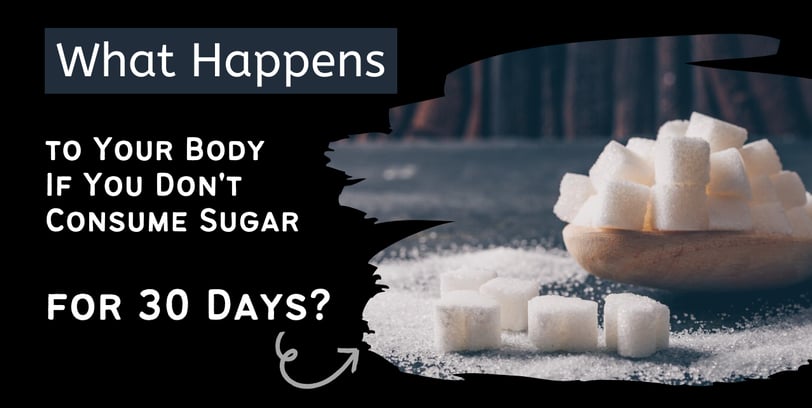What Happens to Your Body If You Don't Consume Sugar for 30 Days
Eliminating sugar from your diet for 30 days can lead to significant changes in your physical and mental health. This article explores the scientific effects of a sugar-free diet, from weight loss to improved energy levels, and how the body adjusts to a life without added sugars.
MEN & WOMEN
1/19/20254 min read


Sugar is one of the most common ingredients in modern diets, found not only in sweets and pastries but also in processed foods, sauces, and even bread. While small amounts of natural sugars found in fruits and dairy products are part of a balanced diet, excessive consumption of added sugars can lead to various health problems. What happens when you go sugar-free for 30 days? Let's delve into the science behind this lifestyle change.
Days 1-7: Initial Adjustment
The first week without sugar can be difficult. For many, sugar is an addictive substance that stimulates the brain's reward system, similar to drugs like nicotine. When you stop consuming sugar, your body experiences withdrawal symptoms.
Physical Symptoms
Fatigue: Sugar provides a quick burst of energy. Without it, you may feel sluggish as your body adjusts to using stored fat and glycogen for energy.
Headache: Going sugar-free can lead to headaches as your brain adjusts to lower glucose levels.
Sugary Cravings: You may experience intense cravings for sugary foods, especially if sugar is a major part of your diet.
Psychological Symptoms
Mood Swings: Sugar affects serotonin, a neurotransmitter that regulates mood. Eliminating it may lead to irritability or even mild depression in the first few days.
Brain Fog: The lack of quick glucose energy may make it difficult to concentrate at first.
Scientific Insight: Studies show that consuming sugar activates dopamine receptors in the brain, triggering a cycle of addiction. When the brain stops consuming sugar, it rewires itself, resulting in temporary discomfort.
Days 8-14: Energy Stabilization and Reduced Cravings
As you enter the second week, your body begins to adjust to the absence of sugar. You may notice a change in your energy levels and overall health.
Improved Energy
Without sudden sugar spikes and dips, your blood sugar levels stabilize. This leads to more consistent energy throughout the day. You may no longer feel the need for an afternoon nap or suffer from post-lunch sluggishness.
Better Digestion
Excessive sugar intake can upset the balance of gut bacteria. By cutting back, beneficial bacteria begin to flourish, improving digestion and reducing bloating.
Reduced Food Cravings
By the second week, your taste buds may become more sensitive. Naturally sweet foods, such as fruits, may begin to taste sweeter, making them more satisfying.
Scientific Overview: A 2016 study published in the journal Nutrients found that reducing added sugars significantly improved metabolic markers, including insulin sensitivity, in just two weeks.
Days 15-21: Noticeable Physical Changes
By week three, the changes become more noticeable, both externally and internally.
Weight Loss
Calorie Reduction: Reducing sugar intake eliminates many high-calorie, low-nutrient foods, leading to natural weight loss.
Lower Insulin Levels: Sugar stimulates insulin production, which promotes fat storage. Without it, the body begins to burn fat for energy.
Improved Skin Health
Sugar contributes to inflammation in the body, which can manifest as acne or dull skin. Many people notice clearer, brighter skin after a few weeks of cutting out sugar.
Better Sleep
Your sleep patterns may improve as you avoid the highs and lows of sugar. You'll likely find it easier to fall asleep and stay asleep.
Scientific Overview: Research published in the Journal of Clinical Investigation highlights that consuming large amounts of sugar exacerbates inflammation, which is linked to various skin and health conditions. Reducing sugar can reverse these effects over time.
Days 22-30: Long-Term Benefits Begin
By the final week of your sugar-free challenge, you may feel like a completely different person. The long-term benefits of going sugar-free are becoming clear, and many of these changes can motivate you to stick with this lifestyle.
Improved Mental Clarity
Sugar-induced brain fog is replaced by sharper focus and improved cognitive function. Many people report feeling more productive and clear-headed.
Improved Heart Health
A lower sugar intake reduces the risk of heart disease. Over time, cholesterol levels improve, and blood pressure may decrease.
Stronger Immune System
Excessive sugar intake weakens the immune system, making you more susceptible to infection. After a month of sugar-free living, your body's ability to fight off disease improves.
Scientific Overview: A study published in the Journal of the American Medical Association Internal Medicine found that high sugar intake is associated with a higher risk of cardiovascular disease. Reducing sugar intake significantly reduces this risk, even in the short term.
Other Notable Changes After 30 Days
Reduced Risk of Chronic Disease: Regularly consuming added sugars is associated with an increased risk of type 2 diabetes, obesity, and fatty liver disease. Reducing your sugar intake reduces these risks.
Changes in Taste Preferences: After a month of going sugar-free, you may find that sugary foods taste too sweet. This change can help you maintain a healthy diet in the long run.
Financial Savings: Avoiding sugary snacks and drinks can save you money, a practical benefit of this lifestyle change.
Challenges and Tips for Success
Despite the many benefits of going sugar-free, it's not always easy to completely avoid it. Here are some tips to help you succeed:
Read Labels: Sugar has many names, such as high fructose corn syrup, dextrose, and maltose. Be careful when shopping for groceries.
Prepare Your Meals at Home: Home cooking allows you to control the ingredients in your food.
Focus on whole foods: Fruits, vegetables, lean proteins, and whole grains provide natural sweetness and essential nutrients.
Stay hydrated: Drinking plenty of water reduces sugar cravings.
Find healthy alternatives: Replace sugary snacks with nuts, seeds, or fresh fruit.
The Bottom Line
Going sugar-free for 30 days is an effective way to reset your body and mind. While the first few days may be difficult due to withdrawal symptoms and cravings, the long-term benefits far outweigh the temporary discomfort. From stabilizing energy levels and weight loss to improved skin health and a reduced risk of chronic disease, the positive effects are undeniable.
By understanding the science behind sugar's effects and implementing sustainable strategies, you can make significant progress toward a healthier, more balanced lifestyle. Whether you decide to continue your sugar-free journey or simply reduce your consumption, your body will thank you.
Follow us on social media
Explore fitness articles and personal training options.
Fitness Jobs
© 2024. All rights reserved.
